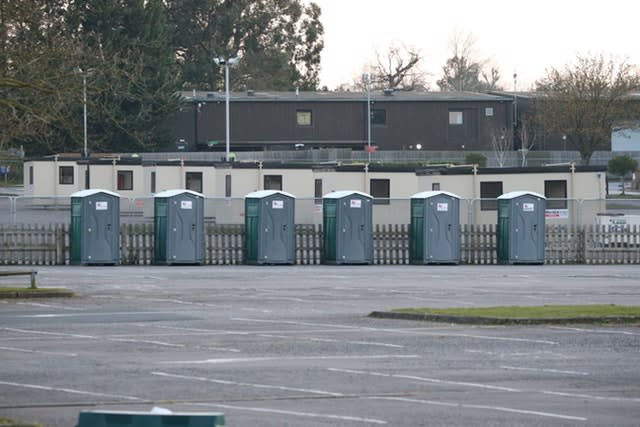Covid-19: NHS staff to receive coronavirus test to help boost workforce capacity
Coronavirus tests for NHS frontline staff are to be trialled this weekend ahead of a wider roll-out to help those given the all-clear from the disease to return to work.
Cabinet minister Michael Gove said the Government was working in a “new alliance” with universities, businesses and researchers to boost testing capacity.
It comes as Prime Minister Boris Johnson faces leading the country’s response to the Covid-19 outbreak from isolation after he tested positive for the virus.
Two of his key lieutenants will also remain in self-isolation this weekend, after Health Secretary Matt Hancock confirmed he had coronavirus and England’s chief medical officer Professor Chris Whitty exhibited symptoms.
On Saturday, Scottish Secretary Alister Jack said he had developed mild symptoms of coronavirus and was self-isolating.
Commenting on the testing plans on Friday, Mr Gove said: “This will be antigen testing – testing whether people currently have the disease – so that our health and social care workers can have security in the knowledge that they are safe to return to work if their test is negative.
“These tests will be trialled for people on the front line starting immediately, with hundreds to take place by the end of the weekend – dramatically scaling up next week.”
PM @BorisJohnson has brought together businesses, research institutes and universities in a new alliance to boost #coronavirus testing capacity for NHS frontline workers.
➡️ https://t.co/liEbTvAiRU pic.twitter.com/7PTs5i5MAg
— UK Prime Minister (@10DowningStreet) March 28, 2020
NHS England chief executive Sir Simon Stevens said the tests would initially be focused on those working in intensive care, A&E, GP practices and staff running ambulance services.
Retailer Boots said it has opened facilities at its headquarters in Nottingham and at Chessington World of Adventures in Surrey to support the Government’s bid to test doctors and nurses.
The testing announcement comes as:
– Relatives of Britons on the Zaandam cruise ship off the coast of Panama expressed fears after four passengers died on board and more than 130 people reported flu-like symptoms
– The Government asked local authorities in England to house all rough sleepers and those in hostels and night shelters by the weekend
– Sir Simon announced the go-ahead had been given for two new temporary hospitals being built in Birmingham and Manchester
Following the announcement of NHS Nightingale in London — Chief Executive Sir Simon Stevens has confirmed two new hospitals will also open in Birmingham and Manchester, providing care to more patients with #coronavirus. Read our latest update.🏥 https://t.co/GUoWbbg3we pic.twitter.com/69Pi1wcXUX
— NHS England and NHS Improvement (@NHSEngland) March 28, 2020
MPs on the Health and Social Care Committee in the House of Commons were warned earlier this week that NHS staff rotas were under strain.
Workers have been forced to stay at home as a result of following Government guidance to self-isolate when showing Covid-19 symptoms, such as a temperature or cough.
The expanded testing will be free, with those getting a negative result able to return to work, the Department of Health and Social Care said.
The Government plans to open a laboratory to analyse samples this weekend, with the aim of carrying out about 800 tests at designated sites in hotspot areas such as London and then scaled up in the weeks to come.
One critical care nurse self-isolating in Manchester with mild symptoms, who asked not to be named, said her unit had around a quarter of nursing staff off work – some 50 people.
She told the PA news agency: “I’ve called 111 yesterday and today and called the hospital I work at and our local Boots to ask about testing.
“111 don’t know anything more than the news and neither do the hospital. So no, don’t feel optimistic at all.”

She said it was “very frustrating” and felt “useless” being stuck at home with another nurse and a doctor.
With training in “extra-corporeal life support”, she said she and a housemate would “be far more use at work if we could just get a test”.
She added: “I feel well enough to work but feel I’ve a responsibility to keep my colleagues safe.”
There was hope the drastic social distancing measures could significantly suppress the death toll from the 250,000 originally feared.
The UK is on course for 5,700 deaths if it follows the same trajectory as China, according to research from Imperial College London carried out before the shutdown was announced.
Sir Patrick Vallance, the Government’s chief scientific adviser, previously said it would be a “good outcome” to keep the figure below 20,000.
But caution was urged over the latest study, which is yet to go under the peer-review process.
Mike Tildesley, an associate professor of infectious disease modelling at Warwick University, said the study does not perform modelling or forecasting and only compares the UK rates to the impacts on other nations.
“So what we don’t know yet is what will happen when we start to see a lift in these control measures and whether it’s possible we could then see a second wave,” he told BBC Radio 4’s Today programme.
The research emerged as a total of 759 people died in UK hospitals after being diagnosed with coronavirus, while 14,579 tested positive and hundreds of thousands more are thought to be infected.
It is likely Prof Whitty will be awaiting results of his own test for the virus, while there will be concerns in Government over who could be affected next.
Chancellor Rishi Sunak and Cabinet Secretary Sir Mark Sedwill have both been with the Prime Minister in recent days, but had displayed no symptoms on Friday night and therefore had not been tested.
Mr Gove said the diagnosis of Mr Johnson and Mr Hancock showed the “virus does not discriminate”, warning: “We are all at risk.”

 Yahoo News
Yahoo News 
